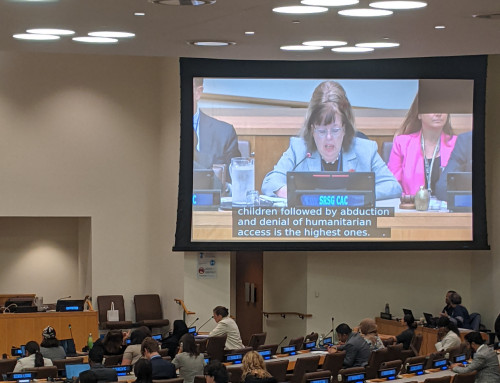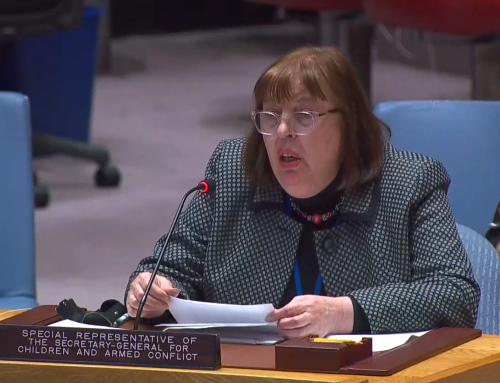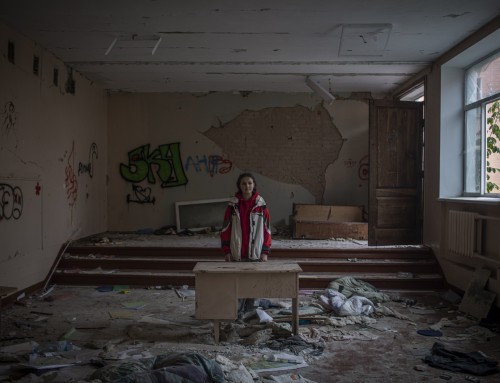Statement by Ms. Leila Zerrougui
SRSG for Children and Armed Conflict
to the
Third Committee of the General Assembly
Promotion and protection of the rights of children
12 October 2016
Please check against delivery
Ms. Chairwoman,
Distinguished delegates,
Dear colleagues,
Ladies and gentlemen,
I am happy to be here today with my colleagues Ms. Santos-Pais, Mr. Gilmour and Mr. Abdi to update the Third Committee on the children and armed conflict mandate at this interactive dialogue.
I would like to use this opportunity to outline the current challenges we face and reinforce some recommendations regarding how we can work together to improve the protection of children. I hope it will provide some food for thought as we approach the 20th anniversary of the establishment of the CAAC mandate by the General Assembly.
I am sure that my colleagues sitting here with me will agree that we face a daunting task to reduce the impact of armed conflict on children. The report before you clearly notes the serious challenges in our work. In particular, the means and methods of warfare used by some parties to conflict have killed and maimed thousands of children and forced millions to flee in search of a safer environment. The unspeakable plight of children in South Sudan, Syria and Yemen illustrates the gravity of the current circumstances, and the urgent need for action at all levels.
While the situation is grave in certain conflicts, there is some encouraging progress in others. In Colombia, the separation of children from FARC-EP is ongoing and the parties are fully committed to protecting children, despite the recent outcome of the referendum. In Sudan, 21 children, that had been detained for over a year and whom I met during a visit in March, were recently released by the Government. In Somalia, Puntland authorities agreed to release 26 children, aged between 12 and 14, who were allegedly associated with al-Shabaab. Last week they were transferred to a local child protection agency for reintegration. The United Nations continues to undertake committed advocacy regarding a group of older children still in detention, some of whom have been sentenced to death in contravention of Somalia’s obligations under the Convention on the Rights of the Child.
Coordinated and sustained advocacy by all actors has led to results, but it is not enough. The treatment of children separated from, or allegedly associated with, armed groups is one my most pressing concerns. Over two thousand years ago Cicero said “in times of war, the law falls silent”. Unfortunately, this maxim still rings true today with current national security responses, where legal institutions are being sidelined in favour of military or other security actors. In certain situations, deprivation of liberty of civilians, including children, outside legal frameworks and without due process, is becoming the de facto response. Detention is also being used to recruit and use children for intelligence gathering, which put them in grave danger and compromises their future reintegration.
Arbitrary detention is being used by some States because they consider that they face such serious threats that forcing the law to fall silent on fair trial is their only option. While acts by some armed groups are clearly abhorrent and there are serious threats faced by Member States, this does not justify pervasive lawlessness and human rights violations in security responses. In this regard, I am encouraged that the General Assembly’s resolution on the Global Counter-Terrorism Strategy Review called for fair, humane, transparent and accountable criminal justice systems, which take into account the rights and needs of children as a fundamental basis of any strategy to counter terrorism. We must work together to ensure that law and justice are respected and your call becomes a reality.
I would like to complement your call by adding that children who have been recruited and used must be treated primarily as victims. This is a vital component of fairness and humanity. Reintegration of separated children is also crucial to ensure the long-term sustainability of peace, security and development. This body and the individual Member States you represent have an important role in persuading Governments and others with the capacity to do so to provide the necessary support for reintegration programmes. One area of focus I would like to suggest for increased resources, both technical and financial, is the provision of psychosocial support to children.
Some conduct on the battlefield by Government forces or their allies is also seriously impacting children. The report notes that the proliferation of actors involved in armed conflicts and a corresponding increase in aerial operations were particular concerns. This is self-evident from the number of situations where repeated large-scale incidents of killing and maiming of children are occurring. These incidents are often linked to the use of explosive weapons with wide effects in populated areas.
Healthcare institutions and workers are also frequent casualties of these types of munitions. Despite recent initiatives on this issue and high-profile condemnations, attacks on healthcare still continue at an alarming level. In the report, I recommended that commitments be made by Governments not to use these types of weapons in populated areas. I would like to emphasize that a commitment to this effect merely reiterates adherence to basic principles of international humanitarian law such as distinction and proportionality.
The increasing use of militia and armed groups by Governments also worries me deeply. The progress achieved over the years to increase the protection of children is jeopardised by this ‘outsourcing’ of conflict. We have worked to train armed forces on children protection and international law, and on instituting systems to prevent violations. This is particularly true regarding the recruitment and use of children. However, these pro-government groups frequently comprise fighters from the local community who lack training, and do not respect or even understand international humanitarian law. We see that these groups are recruiting and using children from their communities. We see that some are committing the same atrocities against boys and girls as the armed groups they are supposed to counteract.
As different components of the United Nations, we must make a more compelling case to Governments that heavy-handed responses are dangerously counterproductive to their own interests of security, development and prosperity. It is clearer than ever that one of the main drivers of recruitment for armed groups is violations of international law by Government forces or their allies. Such violations, and lack of accountability, only perpetuate conflict.
Madam Chair,
A few weeks ago, the General assembly hosted the high-level meeting to address large movements of refugees and migrants. I applaud you for your work on the outcome document, which included strong commitments to protect the human rights of all refugees, including girls. Ensuring that all refugee children are receiving education within a few months of arrival is a particularly welcome target. I urge you to translate these words into action – much more is needed to implement these ambitious commitments. Moving forward, I hope that you will strongly focus on the rights of children affected by conflict in discussions on the global compact on refugees. We also must not forget internally displaced children in our work. They are just as vulnerable as refugees and in some circumstances even more so. We must find other fora to address the plight of these children.
In this regard, the Sustainable Development Goals represent a key opportunity to help all children affected by armed conflict, including IDPs. There is strong interest in their implementation from a broad spectrum of different actors, including the private sector. This interest can be harnessed to ensure that capacity and financing is available in order to help those left furthest behind by devastating conflicts. I noted in the report that education in emergencies and support to children disabled by conflict should be a particular focus in the implementation of the SDGs and I hope you will take that on board.
Madam Chair,
In this 20th year of the mandate, the report before you clearly highlights that progress has been made, including in the context of the “Children, Not Soldiers” campaign. But it is not enough. I have just suggested some core initiatives for the General Assembly and others to consider. However, it would be naïve to think that we can achieve serious progress without prioritizing conflict resolution and prevention. This is the only way that we stand a chance of significantly reducing the number of violations against children. Otherwise, we will have to resign ourselves to incremental progress that can easily be wiped out with a change in the conflict dynamics.
I look forward to your comments and questions on either the content of the report or my remarks today.
Thank you.





